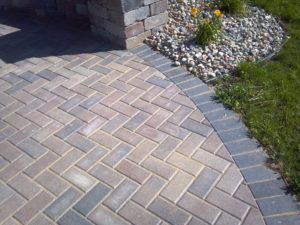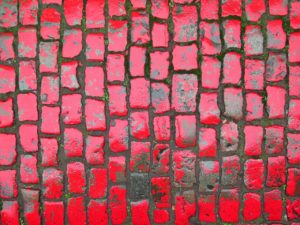When it comes to designing a pool deck for your home, there are many options available on the market. As you may know, two of the most popular paver materials are travertine and porcelain – and each of them has unique characteristics and features that make it a great choice for pool decks.
So, in this article, we will explore the discussion behind travertine vs porcelain for a pool deck to help you determine which one is best for your home. If you’d like to read a complete guide on white pool pavers instead, click here.
Travertine vs Porcelain Pavers for a Pool Deck
First of all, let’s paint a broad perspective on both products. We can compare them after we understand why they share such a big commercial demand in the U.S.
Travertine is a natural stone that has been used for centuries in construction and architecture – formed by mineral deposits in hot springs and geysers. This type of limestone has a unique texture and appearance, offering a natural and rustic look to any ambiance. It is available in a range of colors, from light beige to dark brown, and can be finished in various textures, such as honed, tumbled, brushed, or polished.
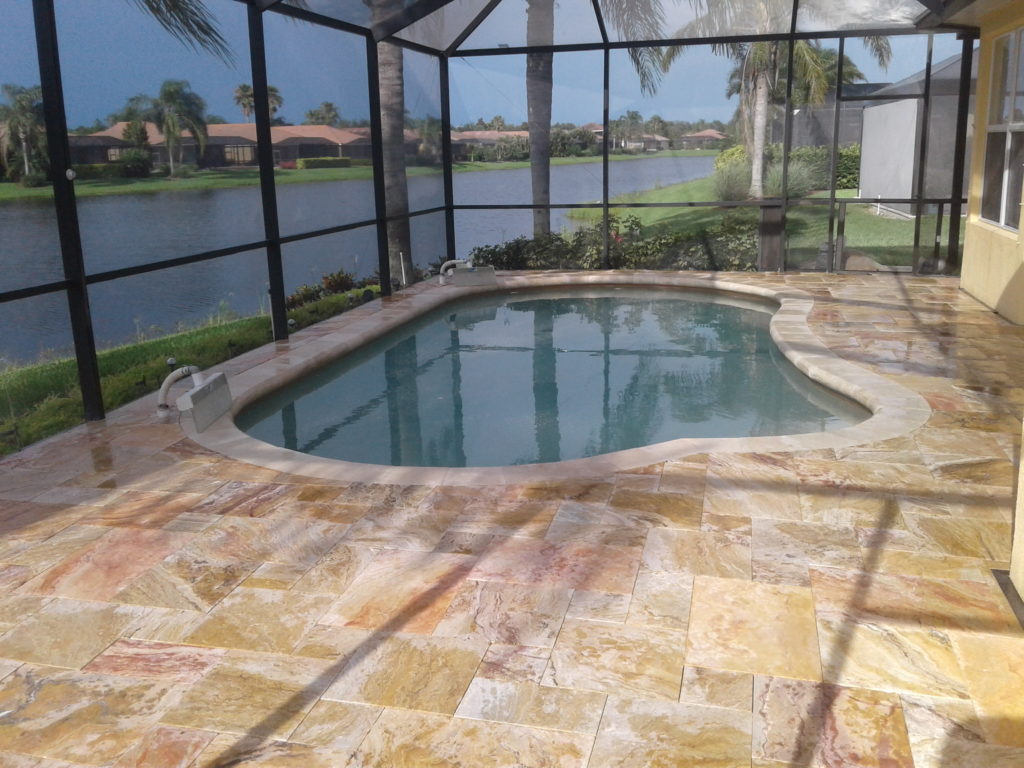
One of the biggest advantages of travertine pool decks is their durability. Travertine is a tough material that can withstand heavy foot traffic, extreme temperatures, and harsh weather conditions. It is also slip-resistant, which is the perfect addition if you have kids because it makes pool areas safer than ever. Travertine is also low-maintenance, as it requires only occasional cleaning to keep its appearance intact.
Porcelain, on the other hand, is a type of ceramic tile that is made from a mixture of clay, feldspar, and quartz. It is a highly durable and versatile material that, other than pavers, is used in a wide range of applications – from flooring to walls to countertops and much more. Porcelain pavers can be manufactured to resemble various natural materials, such as stone, wood, or concrete, and are available in a range of sizes, colors, and textures.
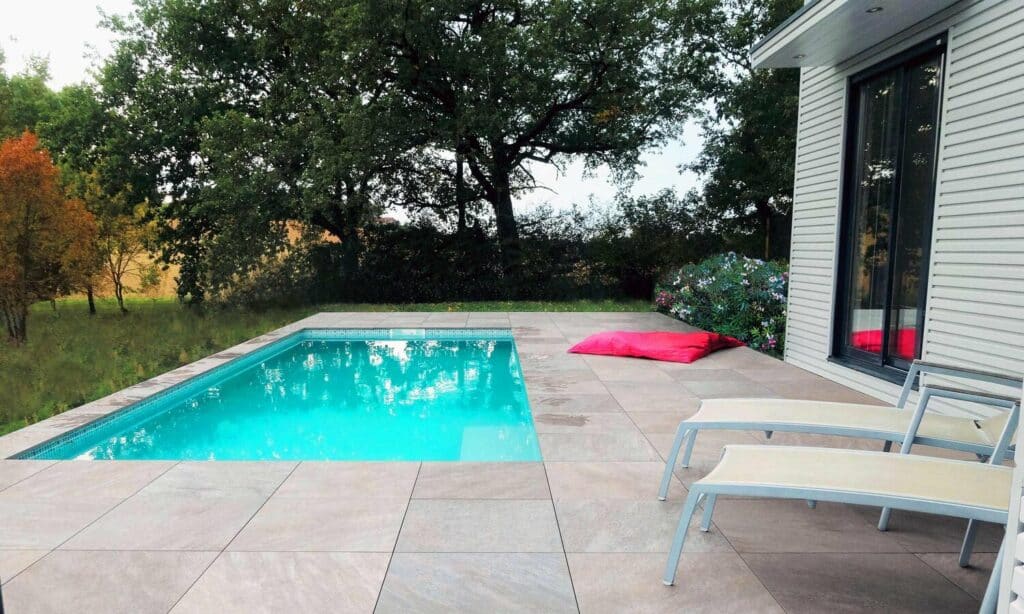
That said, one of the biggest advantages of porcelain pool decks is their versatility. Porcelain tiles can be designed to match any style or color scheme, from modern to traditional to rustic. They are also highly resistant to water, stains, and fading, which makes them ideal for pool areas. Porcelain pavers are also easy to clean and maintain, as they are non-porous – meaning they do not absorb dirt or moisture and, unlike brick or concrete, don’t need to be sealed.
Travertine vs Porcelain Paver for a Pool Deck: Which Is Better?
At the end of the day, both travertine and porcelain have their own unique advantages and disadvantages. Nevertheless, both types of paving stones share the properties that make for a good pool deck, which are:
- traction;
- beauty;
- versatility;
- cool surface (low heat retention);
- longevity.
Read as well: Best Materials for Pool Coping
Below are some factors to consider when choosing between the two materials for a pool deck.
Appearance
While travertine pavers have a natural and rustic look that can give your pool area a warm and inviting feel, porcelain pavers can be manufactured to resemble any natural material, making them more versatile in terms of design options that can please anyone’s taste.
Durability
Travertine is a tough and durable material that can withstand heavy foot traffic and extreme temperatures without heating up. Likewise, porcelain – being a manmade material and all – is designed to be highly resistant to water, stains, and fading. In technical terms, this one is a tie, except when you consider that porcelain can’t be repaired by conventional means when it’s cracked or chipped away, like travertine (a paving stone you can mend with epoxy, for example).
Slip Resistance
Travertine has a natural texture that provides good traction and slip resistance. Porcelain tiles, although non-slippery too, can be finished with a slip-resistant coating to enhance their safety features in the long run.
Maintenance
As we mentioned, cleaning and sealing is part of the deal when we talk pavers. However, even though travertine requires occasional cleaning, sealing this type of paver is mostly optional and depends on the social nature of your pool deck.
You see, since sealing prevents water absorption, the very thing that makes travertine so special is gone when you apply a sealant to its surface – and the same goes for porcelain that’s constantly in contact with moisture. However, in order to maintain their appearance and durability, sealing these pavers might be the best course of action for some people, so make sure to consult the opinion of an expert before making any permanent decisions.
Cost
Travertine is generally more expensive than porcelain (ranging from $5 to $15 per square foot), as it is a natural stone that requires more processing and transportation. Porcelain is a more cost-effective option that offers similar durability and design options, but whose price doesn’t stray too much ($4 to $10 per square foot).
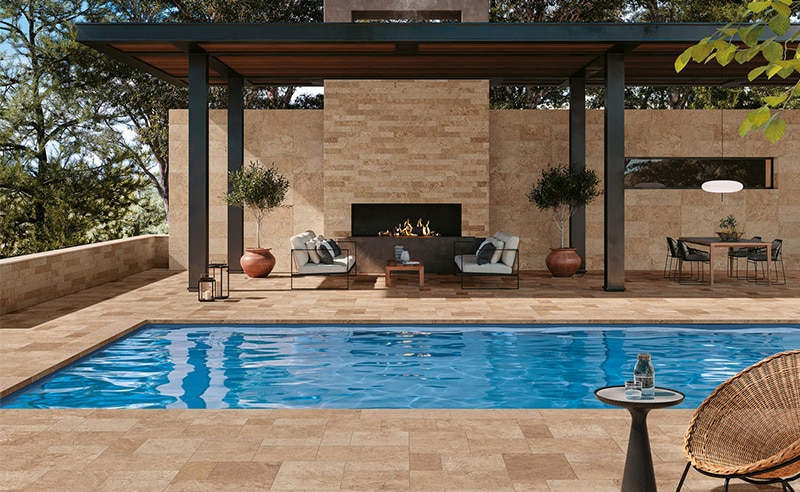
So, How Can You Choose the Best Pavers?
Travertine and porcelain pool decks are both great options for homeowners who want a durable and stylish pool area. While travertine offers a natural and rustic aesthetics, porcelain tiles offer more design options, but both are highly resistant to water, stains, and fading. Ultimately, the decision between travertine and porcelain will depend on your personal preference, budget, and specific needs.
And if you’re looking for a high-quality pool deck for your home in Sarasota, Florida, S&S Pavers is here to help. Our team of experienced professionals can help you choose the best materials and design options for your home, ensuring that your project is completed on time and within budget.You can contact us any time for a free estimate of our services – call us right now at 941-773-3098 or email us at sales@sspavers.com. We would be happy to hear from you.



